Healthcare CRM: Benefits, Development Steps & Budget Breakdown


Are your patient engagement efforts falling short despite offering top-quality care? You’re not alone. In today’s competitive and digitally driven healthcare environment, delivering clinical excellence is just one part of the equation. The real challenge lies in how effectively you connect with your patients—before, during, and after their visit.
Modern patients expect seamless communication, faster appointment scheduling, personalized treatment journeys, and follow-ups that don’t get lost in the shuffle. Traditional systems simply can’t keep up. That’s where Healthcare CRM (Customer Relationship Management) platforms are changing the game.
According to market research, the global healthcare CRM market is projected to reach $43.40 billion by 2034, growing at a CAGR of 9.76% from 2025 to 2034.
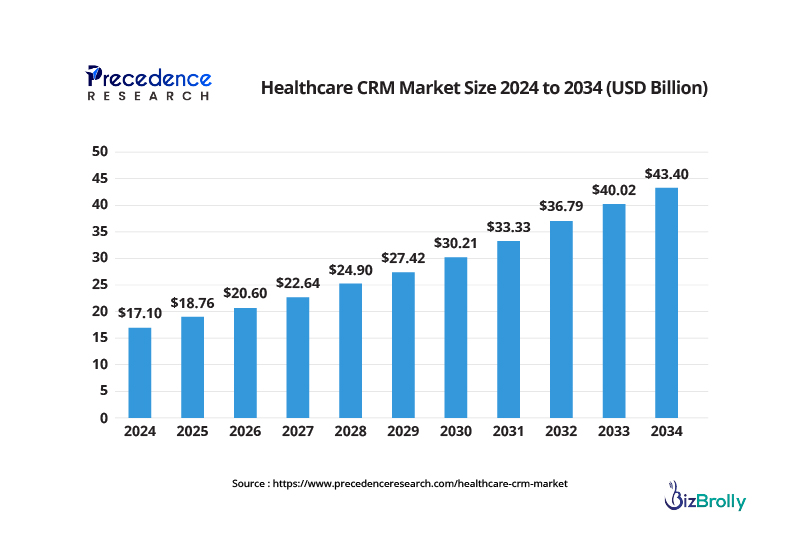
This impressive growth highlights a crucial shift—healthcare providers are increasingly investing in digital tools that not only streamline their operations but also build long-term patient loyalty and satisfaction.
In this blog, we’ll explore everything you need to know about healthcare CRM: its benefits, features, types, cost factors, challenges, and how to choose the best one for your organization. Let’s get started.
A Healthcare Customer Relationship Management (CRM) system is a specialized software solution designed to assist hospitals, clinics, and other healthcare providers in effectively managing their interactions with patients, optimizing operations, and enhancing patient care.
Unlike general CRM platforms used in industries like sales or retail, a healthcare CRM is built with patient-centric workflows in mind. It captures and organizes vital patient data—from demographics and medical history to communication preferences and appointment activity—into a single, centralized system. This empowers care teams to deliver more personalized, timely, and coordinated care.
Healthcare CRMs go beyond just storing contact details. They can automate appointment reminders, track patient engagement, manage feedback, and even integrate with Electronic Health Records (EHRs) for a seamless flow of clinical and non-clinical information. This not only helps in improving care quality but also boosts administrative efficiency and reduces no-shows or patient drop-offs.
In short, a healthcare CRM acts as a digital assistant for your organization—helping you understand patient behavior, communicate better, and build lasting relationships based on trust and consistency.
Implementing a Healthcare CRM (Customer Relationship Management) system is now a crucial strategic decision that can significantly improve patient engagement, operational efficiency, and overall quality of care. Here’s a deep dive into the core benefits that make CRM solutions essential in modern healthcare.
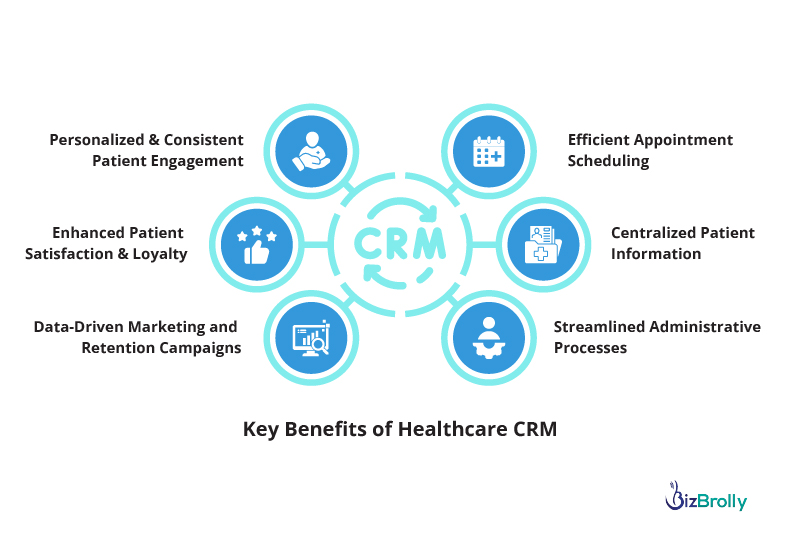
Patients today have high expectations when it comes to their healthcare experiences. They desire the same level of convenience and personalization that they receive in other industries, such as eCommerce or banking. A healthcare CRM is a valuable tool that enables providers to meet these expectations by delivering consistent and timely communication. This can include appointment reminders, follow-up care instructions, birthday greetings, or wellness tips, all sent through email, SMS, or apps. These thoughtful interactions go a long way in making patients feel valued and cared for, even outside of the clinic walls. Ultimately, this helps to build trust and strengthen the connection between patients and their healthcare providers.
Customer Relationship Management systems (CRMs) streamline the appointment booking process by allowing patients to easily schedule, reschedule, or cancel appointments through self-service portals. Automated reminders sent via SMS or email help to drastically decrease the number of missed appointments, which currently result in billions of dollars in losses for the U.S. healthcare system each year. Additionally, clinics are able to promptly reallocate canceled appointment slots, leading to improved resource utilization.
Healthcare CRM systems centralize patient data, including demographics, visit history, treatment plans, lab results, and communication records, in a single location. This consolidation equips care teams with a comprehensive view of the patient’s journey, enabling them to make well-informed decisions and deliver personalized care at every touchpoint.
Healthcare CRMs streamline operations by automating repetitive tasks such as intake forms, billing reminders, insurance verification, and satisfaction surveys. This automation saves valuable time previously spent on manual work, allowing staff to redirect their focus towards providing quality patient care. By improving internal efficiency and reducing burnout, healthcare CRMs play a crucial role in enhancing overall productivity within healthcare organizations.
Customer Relationship Management (CRM) systems segment patient data, enabling healthcare providers to implement personalized outreach initiatives. This includes notifying high-risk patient groups about seasonal vaccines, sending post-discharge checklists, and inviting patients to participate in wellness webinars. These efforts not only enhance care continuity but also contribute to increased patient retention rates.
In the realm of healthcare, effective communication, prompt service, and personalized care are paramount in ensuring patient satisfaction. When patients experience clear communication, expedited service, and individualized attention, their levels of contentment skyrocket. Satisfied patients are not only inclined to revisit your practice, but also to share positive feedback and refer others, thereby fostering sustained growth for your establishment.
When it comes to selecting a CRM for healthcare, it’s essential to look beyond generic features. Healthcare CRM systems must handle sensitive data, ensure compliance, and improve care coordination while delivering personalized patient experiences. Here are the must-have features that make a healthcare CRM truly effective:
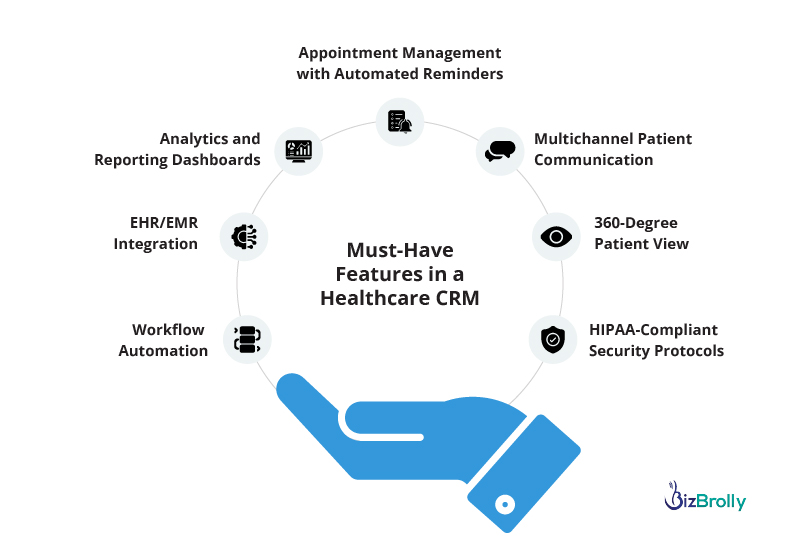
A comprehensive view of the patient allows healthcare professionals to access medical history, treatment records, communication preferences, and ongoing care plans in one place. This complete visibility enables providers to deliver personalized and timely care without searching across multiple systems.
An integrated scheduling system helps streamline the booking process while minimizing no-shows. Automated reminders via SMS or email help ensure that patients remember their appointments, while also giving them the option to confirm, cancel, or reschedule easily.
Healthcare CRMs must support communication across email, SMS, phone, and secure messaging portals. This ensures patients receive timely updates, follow-ups, and care instructions on their preferred channels, enhancing engagement and trust.
Integration with Electronic Health Record or Medical Record systems is essential for seamless data sharing between clinical and administrative teams. This eliminates the need for duplicate data entry and ensures accuracy across the board.
Advanced analytics tools allow healthcare providers to monitor patient trends, campaign effectiveness, and operational metrics. Custom dashboards offer insights that help optimize workflows and make informed decisions faster.
With privacy being paramount in healthcare, CRM systems must include built-in security features that comply with HIPAA and other data protection regulations. Role-based access, encryption, and audit trails are critical for maintaining patient trust and legal compliance.
Automating repetitive tasks such as patient intake, follow-up emails, insurance verification, and post-visit surveys reduces administrative burden and ensures consistency in processes. This not only saves time but also improves patient satisfaction and staff productivity.
A CRM that offers these features can truly transform how healthcare organizations interact with patients, streamline operations, and ensure quality outcomes at every touchpoint.
Not every healthcare provider operates the same way—so why should they all use the same CRM model? The scope and complexity of a healthcare CRM largely depend on the size of the practice, the nature of care delivery, and the level of digital infrastructure already in place.
For example, a small clinic may only need basic scheduling and follow-up features, while a hospital demands enterprise-level integration and automation. Similarly, telehealth platforms require real-time virtual engagement tools, and diagnostic centers benefit from CRMs that streamline test scheduling and report distribution.
Here’s a quick comparison of how CRM requirements shift across common healthcare setups:
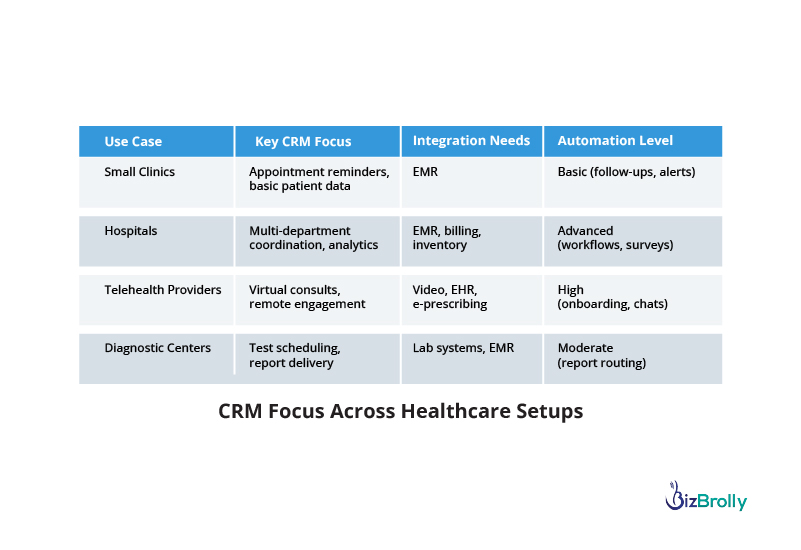
This streamlined breakdown helps healthcare leaders understand where they fit on the CRM spectrum—so they can prioritize features that match their operational and patient engagement needs.
Healthcare CRMs come in various types, each tailored to different goals within an organization. Understanding these types helps in selecting the right system based on your primary objectives—whether it’s enhancing patient relationships, streamlining operations, or improving sales and marketing for healthcare services.
Operational CRMs are focused on automating and improving routine healthcare processes like patient registration, appointment scheduling, billing, and service delivery. These systems ensure that every administrative function runs smoothly, enhancing efficiency and reducing workload on healthcare staff.
Analytical CRMs help providers make informed decisions by collecting, processing, and analyzing patient data. They offer valuable insights into patient behavior, appointment trends, and treatment outcomes—enabling better forecasting, resource planning, and personalized care strategies.
A collaborative CRM facilitates seamless communication between various departments—administration, clinical staff, and even third-party vendors. It ensures that every team involved in the patient’s journey has access to updated information, fostering improved coordination and patient outcomes.
Strategic CRMs are designed to support long-term patient engagement and retention goals. These systems focus on building personalized experiences through long-term data analysis and targeted communication strategies, improving loyalty and trust in the healthcare provider.
Implementing a healthcare CRM is more than just installing software—it’s a strategic transformation that involves aligning technology with care delivery, administrative workflows, and patient engagement models. A well-planned implementation ensures smoother adoption, better ROI, and long-term success.
Here’s a step-by-step breakdown of the healthcare CRM implementation process:
Start by defining your key objectives—whether it’s improving patient communication, automating workflows, or enhancing analytics. Engage stakeholders from different departments to assess pain points and gather requirements.
Outline what success looks like. This could include increased patient retention, reduced no-shows, or faster response times. Setting measurable KPIs will help track progress and validate outcomes post-implementation.
Select a CRM that’s HIPAA-compliant, integrates with existing systems (like EHRs, billing software), and can grow with your organization. Whether cloud-based or on-premise, ensure the platform is user-friendly and customizable.
Carefully plan the migration of existing patient records, appointment histories, and communication logs into the new CRM. Smooth integration with EMRs, telehealth platforms, and lab systems is essential for continuity.
Train healthcare providers, administrative staff, and IT teams on how to use the new CRM effectively. Proper onboarding ensures maximum utilization and reduces resistance to change.
Run a pilot phase to test functionality, fix bugs, and gather feedback. Use these insights to fine-tune workflows before a full-scale rollout.
Once live, continuously monitor CRM performance against your KPIs. Use analytics and feedback to refine workflows, update templates, and enhance user experiences.
Selecting the right healthcare CRM is a critical decision that directly impacts your organization’s efficiency, patient satisfaction, and long-term growth. With so many options available, the key is to align the CRM’s capabilities with your unique operational needs, care model, and long-term objectives.
Here are the key factors to consider when choosing a healthcare CRM:
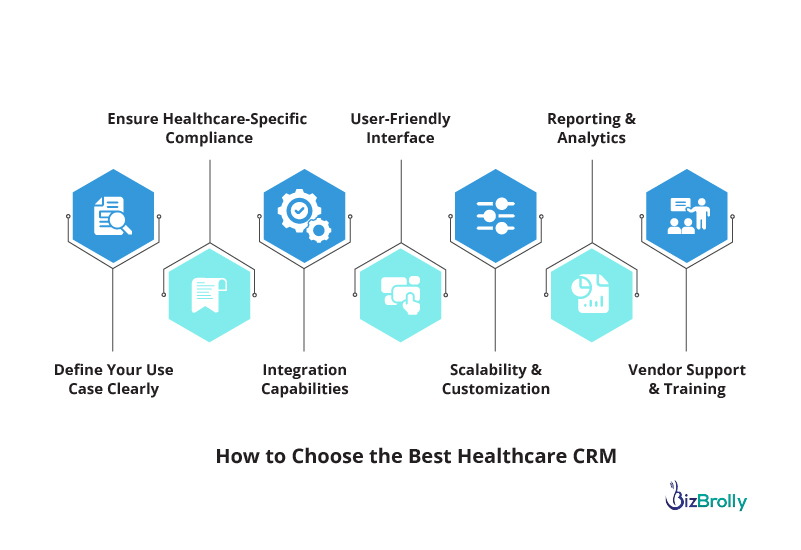
Begin by identifying your top priorities: Is it improving patient engagement? Automating scheduling? Centralizing data? Different CRMs cater to different needs—knowing your exact use case helps you shortlist the right solutions.
HIPAA compliance is non-negotiable. Your CRM must have built-in safeguards for storing and sharing patient data securely. Look for features like role-based access control, data encryption, and audit trails.
A powerful CRM should seamlessly integrate with your Electronic Health Record (EHR) system, billing software, telehealth platform, and even lab systems. Interoperability ensures smooth data flow and eliminates silos.
As your healthcare practice grows, your CRM should evolve with you. Choose a system that can scale with your operations and be customized for workflows, templates, and patient segmentation.
An intuitive, clean interface ensures that staff across all levels—from admin teams to doctors—can quickly adapt and use the system effectively with minimal training.
Insightful dashboards and reporting tools allow you to track patient trends, campaign performance, and appointment efficiency. This helps in making data-driven decisions and refining your strategies.
Evaluate the vendor’s support system. Do they offer implementation guidance, 24/7 assistance, regular updates, and training modules? Ongoing support is crucial for long-term success.
While healthcare CRMs offer enormous benefits, their implementation isn’t without hurdles. From staff resistance to integration issues, several challenges can disrupt the CRM journey if not addressed early. Here’s a closer look at common pain points—and how to solve them effectively.
Many healthcare staff are used to legacy systems or manual processes. Transitioning to a digital CRM can be intimidating.
Engage your teams from the start. Offer hands-on training, highlight time-saving benefits, and position the CRM as a tool to make their work easier—not harder.
Migrating patient records from existing systems to a new CRM can be messy, risking data loss or inconsistencies.
Work with experienced CRM vendors who offer data mapping, cleaning, and secure migration services. Conduct test migrations before going live.
A new CRM may not easily connect with older EHRs, billing software, or lab platforms.
Choose a CRM with flexible APIs and proven integration capabilities. Custom integration development may be necessary in some cases.
Patient data is highly sensitive, and CRMs must comply with regulations like HIPAA.
Opt for a CRM that offers built-in compliance features: data encryption, role-based access, audit trails, and regular security updates.
Implementing CRM without defined goals or KPIs often leads to underutilization.
Create a detailed roadmap: define use cases, expected outcomes, and metrics to track success. Review progress quarterly and optimize accordingly.
Integrating a Healthcare CRM into your existing infrastructure isn’t just a technical task—it’s a strategic process that ensures all your systems speak the same language. When done right, integration empowers teams with real-time insights, enhances patient experience, and improves workflow efficiency.
Here’s a step-by-step approach to seamless CRM integration:
Begin by mapping out your existing tools—EHRs, billing systems, telehealth platforms, lab software—and how data flows across them. This helps identify integration points and avoid duplication of effort.
Select a healthcare CRM that supports open APIs, HL7, or FHIR standards. These enable easy, secure, and structured data exchange between your CRM and other systems.
Decide how often patient data, appointment history, or billing records should sync between systems—real-time or scheduled batch updates? This reduces inconsistencies and ensures a unified patient profile.
Data privacy is paramount. Use encrypted channels and secure authentication for integration. Make sure only authorized personnel can access patient records across systems.
Partner with CRM vendors or third-party developers who specialize in healthcare integrations. They bring experience in navigating compatibility issues, regulatory compliance, and user adoption challenges.
Pilot the integration with a small user group. Check data accuracy, loading speeds, and real-time updates. Fix bugs before full deployment to avoid disruption.
Your teams should understand not only the CRM, but also how it interacts with other platforms. Conduct scenario-based training for real-world application.
BizBrolly Solutions, based in Noida, India, is a technology-driven innovation lab specializing in custom software development, including healthcare CRM solutions. With over a decade of experience and a portfolio of more than 500 successful projects, BizBrolly is well-equipped to assist healthcare organizations in their digital transformation journey.
Custom Healthcare CRM Development: BizBrolly designs tailored CRM systems that enhance patient engagement, streamline workflows, and improve data management.
Integration Services: They ensure seamless integration of CRM solutions with existing Electronic Health Records (EHR), billing systems, and other healthcare platforms, facilitating real-time data access and improved operational efficiency.
Compliance and Security: Understanding the importance of data security in healthcare, BizBrolly develops CRM systems that adhere to industry standards and regulations, ensuring patient data is protected.
User Training and Support: They provide comprehensive training and ongoing support to ensure healthcare professionals can effectively utilize the CRM system, leading to better patient care and satisfaction.
By leveraging our expertise, healthcare providers can implement robust CRM solutions that not only meet their specific needs but also position them for future growth in an increasingly digital healthcare landscape.

Did you know that executives don’t receive the data they need 65% of the t...
Explore more
In recent years, artificial intelligence (AI) has rapidly advanced, with neural ...
Explore more


D-23, Sector 63, Noida,
UP - 201307

141 Westgate Dr, Edison,
NJ - 08820

4 Black lion court, Mill road, Kent, UK – ME71HL

2207, 2220 Lakeshore Blvd W, Toronto ON- M8V0C1

94A Central Road, Jacanlee, Johannesburg 2194